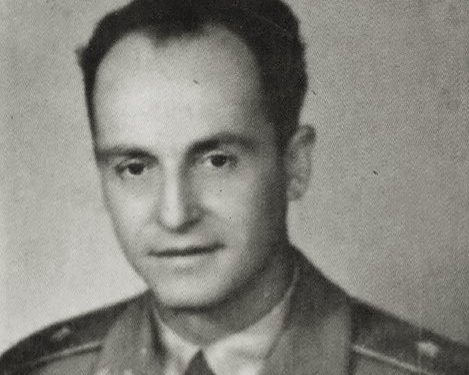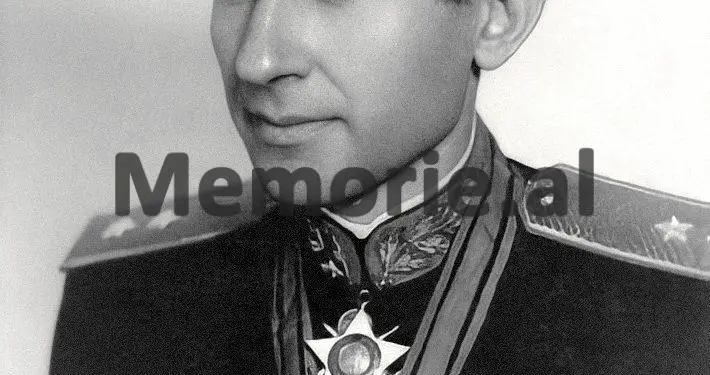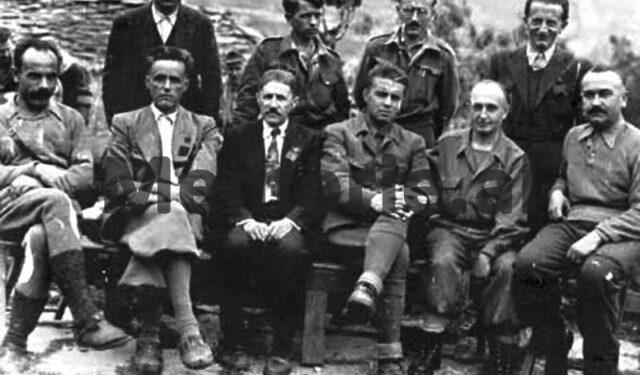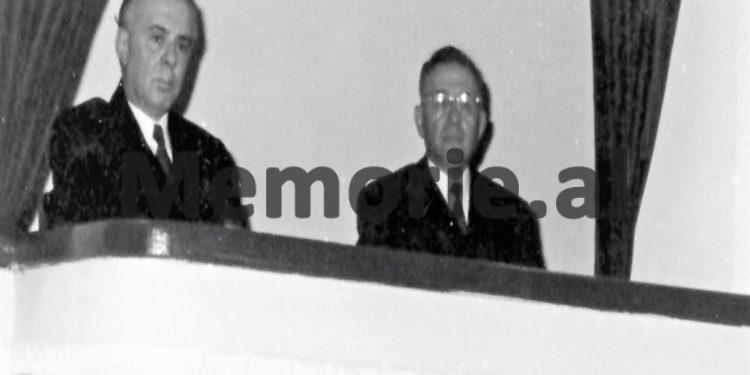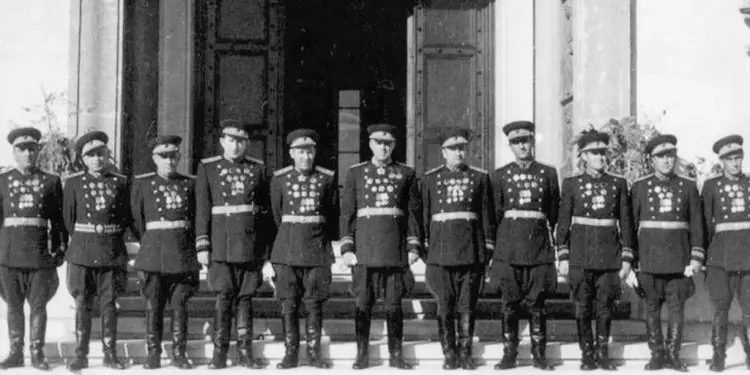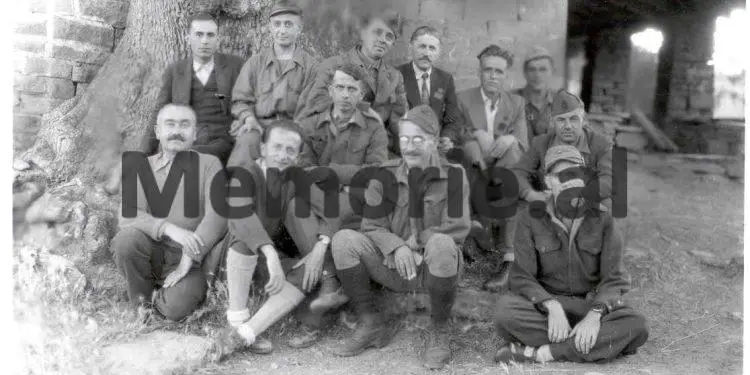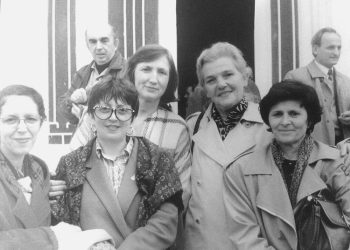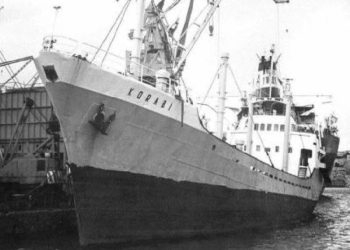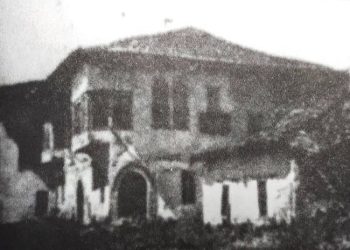-A book about the criminal activity of Hoxha…!-
The first part
Memorie.al / In his book “Prapaskenat kobzeza e Enver Hoxha”, published in 2008, Major General Ernest Jakova makes a scan of all the criminal activity of the dictator Enver Hoxha, both during the years of the War and after, with his installation of one of the harshest dictatorships. For the post-war period, the author mainly stops and analyzes the situation in the Army and behind the scenes in the Ministry of Defense. His book, as a close witness in many affected events, is a valuable reference for researchers, while for readers; it is worth returning attention to this book, especially these times, when thoughts are being articulated for a rehabilitation of the figure of Enver Hoxha…!
After analyzing in three chapters of the book, many theses that deal with his behind-the-scenes leadership of the Communist Party, but also of the War against Nazi-fascist occupiers, and further the installation of the most brutal methods of dictatorship and behind-the-scenes with hostile groups in the army, Major General Ernest Jakova, poses in his book, 17 questions and answers that many may have articulated these three decades after the fall of communism. And at the end of 17 questions, he brings an epilogue to the issue he deals with summarized in 6 conclusions.
Which of Albania’s enemies was the most dangerous at that time?
Answer: a) Fascist Italy, which had invaded Albania on April 7, 1939, had capitulated in September 1943. b) Nazi Germany, which continued the occupation of Albania, was on the verge of losing the war. c) Yugoslavia, which, having Albania as an ally in this war, had intentions to annex Albania after liberation, as its seventh republic.
Given the ferocity of the Serbian occupation of Kosovo, Yugoslavia presented the most dangerous real enemy. In the fight against Nazi-fascism, Albania was in alliance with the Anglo-Soviet-American coalition. But the cooperation of the “National Front” and “Legality” with the German invader could lead Albania to its disintegration, as a country that has lost the war.
But this did not happen, because the forces of the “National Front” and “Legality” were very few and of no value. Whereas the National Liberation Army was so large and powerful that it had contributed by forcing the Germans to keep a significant force of four or five of its divisions in Albania.
It is precisely this war and this contribution that made Albania rank among the winning countries of the war. But, while the cooperation of the “National Front” with the German forces was legal, the annexation of Albania as the seventh republic of Yugoslavia was being prepared to be carried out secretly by the army of the Albanian people.
So, the attitude of the three political parties: the Albanian Communist Party, “Balli Kombëtar” and “Legaliteti”, constitute high treason against the motherland. Despite these extremely negative attitudes of these political parties, the Anti-Fascist National Liberation War of the Albanian people ended magnificently and gloriously.
Because the Albanian people made him patriotic, brave and freedom-loving and led him with the best sons, the commanders of the army units, who with their skills and heroism, led the war to victory in the complete liberation of Albania. As such, magnificent and glorious, it has been recognized and appreciated by the whole world.
Why is the war not talked about more widely?
The subject of the book is Enver Hoxha’s sleazy behind-the-scenes and not the National Liberation War with its operations, battles and battles, which is magnificent and glorious. In the book, the war is talked about in its entirety, only about its most important moments, as much as is necessary to understand well the importance of the moment, the purpose of every behind-the-scenes of Enver Hoxha and the damage it has brought to the war and the Albanian people.
However, in this book, the three stages of the war, the tasks and the results achieved by them and the war as a whole are clearly presented.
What did communism bring to Albania?
After the victory of the socialist revolution in Russia, the communist anti-imperialist ideas spread throughout the world, including in Albania, as more progressive and democratic and which ensure high welfare for the people. That was expected.
But, in fact, communism in Albania and everywhere else, has brought fraud, crime and betrayal and for the peoples the lack of freedom of speech, hunger and suffering and misery. We all lived through the time of the communist dictatorship and remember that freedom of speech was absent and that you always felt hungry, that you could not endure a meal without eating.
But now in democracy, he speaks freely and with all the great corruption that exists, he always feels full even if he doesn’t eat a meal, or even for a day. Communism failed in the Soviet Union itself, with the loss of the economic race with the USA during the Cold War, which led to the dissolution of the Soviet Union, whose countries are now searching for true democracy. There are voices that say that true democracy without class struggle lies in the middle between left and right.
Was Enver Hoxha hidden or surrounded in the mountains of Martanesh?
Above, based on the facts, we have proven that Enver Hoxha, when the German Winter Operation of 1943-1944 began, due to the great fear that had seized him, had gone to hide in the mountains of Martanesh, as the most suitable place, and remained there during the entire time of the successive German operations, from December 1943 to April 1944, leaving the army without direction and himself without an address, until recently, no one knew where he was hiding.
The thoughts that Enver Hoxha was surrounded in the mountains of Martanesh do not stand, because during all this time in Martanesh, the German force did not attack. There was no war there either. Then who was he surrounded by? So, in the mountains of Martanesh, Enver Hoxha was hiding out of fear and not surrounded.
What were the Black Theses?
“BLACK THESES”; this is how Enver Hoxha called the material prepared by Beqir Balluku, with a group of officers, considering that he had done it according to his anti-party ideas and secretly. Made on purpose to deny and not accept the failure of his ideas, the 12th Plenum of the Central Committee of the Party.
In fact, the material was made according to the ideas of Enver Hoxha’s report held at the 12th Plenum of the Central Committee, with his order to expand it and proved that his ideas of “Bunkerization” and those of Mehmet Shehu, about having “Two types of forces” do not hold, they are wrong.
This is proven by the fact that they were forgotten and were not included in the Theses of the Defense Council. So it becomes clear that the “BLACK THESIS” is the “BLACK IDEAS” of Enver Hoxha’s “Bunkerization” and Mehmet Shehu’s “Two types of forces”.
In this greedy backstage of Enver Hoxha, behind the unjust accusation against Beqir Balluku, was hidden the denial of the failure of his ideas of the 12th Plenum, of the Party’s Central Committee. In order to have a more complete understanding of the matter, we must say something more about Beqir Balluk as a soldier.
He was the commander of the partisan battalion of Ishmi, with extensive experience in the war. This battalion, together with the partisan battalion of Dajti and a partisan battalion of Peza, who had extensive experience in the war, formed the Third Assault Brigade.
Beqir Balluku was appointed commander of the Second Assault Brigade, which he formed entirely with young volunteers, who turned out to be partisans and who had no combat experience. They didn’t even give him his battalion of Ishmi.
In addition, he didn’t even have time to compact the Brigade, because in those days, the German Winter Operation 1943-1944 began and it happened that a few days after the formation, without entering the fighting at all, one night, the Brigade became depressed and did not wake up, and it was disbanded. So, for the fault of the General Staff and not for the fault of Beqir Balluk.
But this extremely serious event caused changes in Beqir Balluk’s character. In April 1944, at the Korça Fair, the Second Assault Brigade was reorganized with two battalions and soon, during the action in the Korça Zone, it became four battalions.
But he was no longer the former Beqir Balluku. He was afraid that a great evil like that would happen to him again. He no longer trusted his thoughts and actions. It never made a one-time military action, with the whole brigade, but only on a battalion basis, with regions of action. In every thought and in every action, doubt did not leave him even when he became the Minister of Defense.
After the liberation, although he spent a year at the Higher Military Academy “Voroshilov” of the Soviet Union, he did not make any big changes. It is a fact that during the entire time as Minister of Defense, he could not do any material, lecture or even a military article in the newspaper.
And this has troubled him a lot. From time to time he tried to write something military, but without success. As his secretary, Kozma Zegali, told me, every time he stayed on the first or second page, he didn’t go any further and left. When he prepared the conclusions of the exercises, he would change each expression many times.
So, Beqir Balluku could not have such ideas that Enver Hoxha accused him of. In order to be in order with Enver Hoxha and the Party, Beqir Balluku, for everything important for the army, first took Enver Hoxha’s opinion on them and then spoke, not only with complete conviction but also with pride.
So, he did not have and did not do anything secretly to the Party. The family of Beqir Balluku and that of Enver Hoxha, had their houses nearby and with many children, and lived as if they were a single family for the children.
So, Beqir Balluku was Enver Hoxha’s closest and most loyal person. Then, how is it possible for him to sentence him by firing squad, without deserving it?! Because without Beqir Balluk, he could not justify the existence of the putschists and the liquidation of the main military cadres of the Army. Although all this was a figment of his mind.
Mehmet Shehu knew him just as well, who told him on a work occasion in the presence of me and Mahmut Agolli: “You never become a soldier”. Then how did they leave him for a long time as Minister of Defense, as if he was irreplaceable? Because, in his subordinates, Enver Hoxha first looked at loyalty to him, then their being below his level, so that they would be obedient to him. Petrit Dume was not like that.
What was “Bunkerization”?
Bunkering was a new name, invented and implemented only in Albania that predicted the bunkering of the entire territory of the country, invented by people without a high military education, and with mediocre intellect, just like its author, Enver Hoxha.
This bunkering was carried out after the elimination of the main military cadres of the Army. Even the fortified “Mazhinot” line of France, which was the largest in the world, consisted of only a belt of defense, on the border with Germany, and did not include the entire French territory.
As a rule, the fortification of the country’s defense included: the fortification of the first defense belt, with a depth and width of 10 km. in the main directions, which could be two or three. So, a total of 200 to 300 km. 2 and these partially and not 28,000 km. 2.
Bunkers are placed within the regions of the defense belts, in the amount of weapons that will be placed in them. In our country they were produced and deployed 15-20 times more than was necessary. Very anti-economic, that only a political rationale can be used for justification: to be everywhere in the villages of Albania and on the ground, so that the people could see them and believe that they were under double siege and that the Party and Enver Hoxha were protecting them?
The Volunteer Forces could not be used for defense in bunkers, as in the front, outside their destination. They had many tasks, which they could perform well. As a rule, bunkers are placed underground, according to the principle: “The visible bunker is destroyed by the enemy”. Then they are not placed in a line, but in battle formations echeloned in depth, so as to have cross-fire connections between them and to protect each other.
Why did Mehmet Shehu propose having two types of forces: blocking-blocking and operative-striking?
Mehmet Shehu had extensive experience in partisan warfare. But, for the war with a regular front, he had neither experience nor higher education, because after six months Enver Hoxha removed him from the “Voroshilov” Military Academy of the Soviet Union.
The history of military art does not recognize the existence of two types of forces in defense, when the superiority in forces is possessed by the enemy who teaches. In the Soviet army’s counterattack of Kursk, the superiority in forces was on the Soviet side and could be passed directly to the attack.
But it was preferred first to bleed the enemy with defense, having three fronts in defense and an entire front in reserve, with which, at the right time, it was switched to countermeasures.
Whereas, when the enemy who learns has superiority in forces, having two types of forces in defense has been impossible even for large armies. This is why Enver Hoxha’s “Bunkerization” ideas and Mehmet Shehu’s “Two types of forces” ideas did not hold, they were wrong. Memorie.al
(Prepared by Admirina Peçi)
The next issue follows




